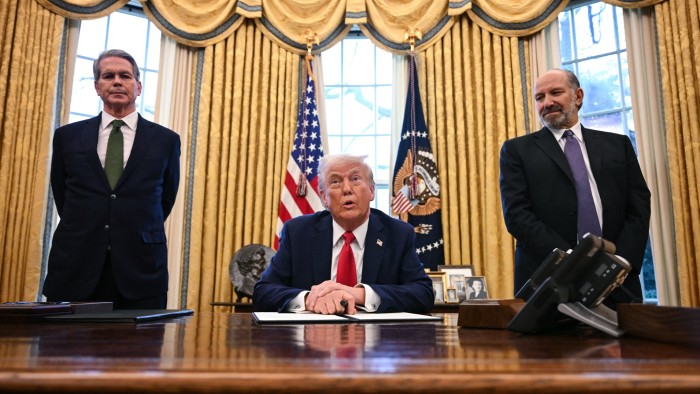Unlock the White House Watch newsletter for free
Your guide to what Trump’s second term means for Washington, business and the world
Donald Trump has accused China of violating its two-week-old tariff truce with the US, threatening to reignite the trade war between the world’s two biggest economies.
China and the US agreed during talks in Geneva two weeks ago to a deal that would temporarily reduce their tit-for-tat tariffs, which had soared as high as 145 per cent.
“I made a FAST DEAL with China in order to save them from what I thought was going to be a very bad situation, and I didn’t want to see that happen,” the US president posted on his Truth Social platform on Friday.
“China, perhaps not surprisingly to some, HAS TOTALLY VIOLATED ITS AGREEMENT WITH US. So much for being Mr. NICE GUY!” Trump added.
The comments suggest that tensions are rising between the two economic powers after slow progress in talks over their long-term trading relationship.
The president did not say how China had broken the agreement or threaten to reimpose punitive tariffs.
US trade representative Jamieson Greer later on Friday said China had been slow to remove the non-tariff trade “countermeasures” it imposed in response to Trump’s duties.
The measures included blacklisting US companies and restricting exports of rare earth magnets that are vital for products ranging from electric vehicles to wind turbines.
“When they agreed in Geneva to remove their tariff and their countermeasures, they removed the tariff like we did but some of the countermeasures they have slowed on,” Greer told CNBC.
“We haven’t seen the flow of some of those critical minerals as they were supposed to be doing,” he added.
Speaking in the Oval Office on Friday afternoon, Trump said China had “violated a big part of the agreement” reached with the US but he added: “I’m sure that I’ll speak to President Xi [Jinping], and hopefully we’ll work that out.”
Trump’s ability to impose the sweeping tariffs that he announced on “liberation day” last month came under threat this week after a US trade court ruled the president did not have legal powers to impose the levies.
A higher court on Thursday paused the ruling while the White House pursues an appeal. The legal battle adds to the uncertainty surrounding US negotiations with China and other significant trading partners.
US Treasury secretary Scott Bessent on Thursday said trade talks with China were “a bit stalled” and might need to be reinvigorated with a call between Trump and Xi.
“I believe we will be having more talks in the next few weeks and I believe we might at some point have a call between the president and party chair Xi,” Bessent told Fox News.
“Given the magnitude of the talks . . . this is going to require both leaders to weigh in with each other,” he said, adding that he was “confident that the Chinese will come to the table when president Trump makes his preferences known”.
China’s foreign affairs ministry on Friday declined to comment on Bessent’s remarks.
Trump has on various occasions raised the possibility of a phone call with Xi. He insisted before the talks on May 12 that they had spoken but China has consistently denied this.
After the talks in Switzerland, the two countries said they would slash tariffs on each other’s goods for at least the next 90 days, with the extra levies the US imposed on China this year falling to 30 per cent and China’s declining to 10 per cent.
As part of the deal, China also agreed to “suspend or cancel” non-tariff measures against the US, but did not provide any details.
The Chinese commerce ministry said after the talks that both sides had agreed to set up a “China-US economic and trade consultation mechanism, to maintain close communication” on the matter.
It said the two sides would hold consultations regularly or as needed, “alternating between China and the United States, or in a mutually agreed third country”.
But since then, there have been few public announcements on the talks from either side, with the Trump administration instead imposing further restrictions on the use of US technology by Chinese companies.
“From the perspective of the long-term and complex nature of the struggle with the US, we should not only be fully prepared for negotiations but also be ready for a prolonged confrontation,” wrote Huo Jianguo, a vice-chair of the China Society for World Trade Organization Studies on Beijing, in Communist party affiliated media China Economic Net.
Additional reporting by James Politi in Washington

